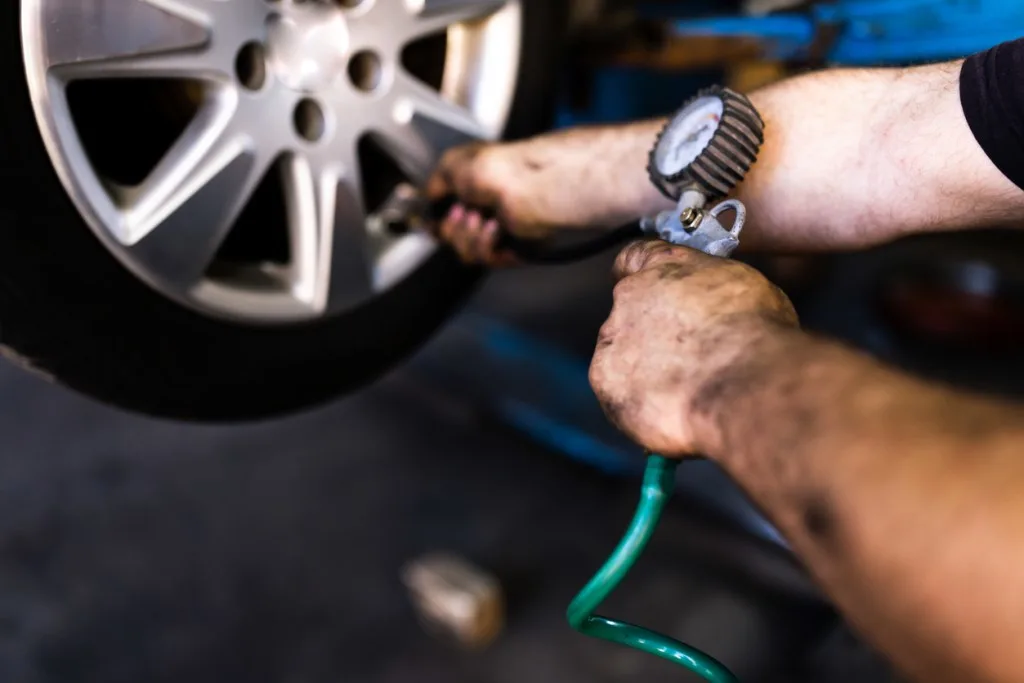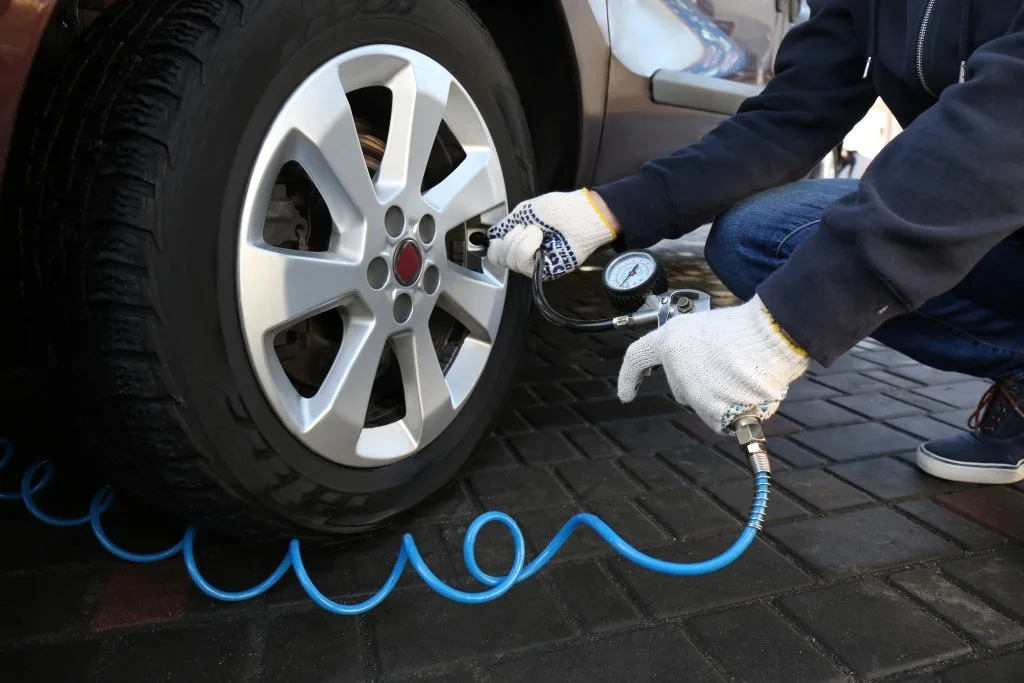Those green caps on your tires mean you have Nitrogen-filled tires.
A smooth-talking salesperson may have even encouraged you to choose nitrogen over air in your tires.
But did you get swindled? Are nitrogen-filled tires nothing more than a sales gimmick?
Let’s take a look and see!
The Difference Between Nitrogen And Air
Nitrogen and air are two of the most common gasses to fill inflatable tires. Nitrogen molecules are larger than air molecules, making it harder to leak over time. With air in your tires, you may lose pressure in your tires and need to top them off more often.
Nitrogen is also a dry gas, which does not support moisture. Moisture can cause the rubber compounds in tires to break down and cause premature aging for your tires. Using air can allow moisture to enter your tires and cause internal corrosion to the wheels on your vehicle.
No matter which type of gas you put in your tires, you should check your tire pressure regularly. Driving with underinflated tires can be dangerous no matter what type of gas is inside of them.

Proposed Benefits Of Using Nitrogen Over Air In Tires
Using nitrogen over air in your tires can be very beneficial. Let’s look at a handful of the reasons why you might consider using nitrogen in your tires.
Reduce Air Loss
All tires experience a loss of pressure, but the type of gas used can reduce this loss. Consumer Reports shares that a tire with regular air will typically lose about 1 or 2 PSI of air pressure per month. On the other hand, nitrogen tires lose about 1.3 PSI over an entire year.
Nitrogen contains larger molecules, which makes it more susceptible to leaks. Punctures from nails and other road hazards will still damage your nitrogen-filled tires and cause pressure loss. However, you’re less likely to experience changes in pressure under normal driving circumstances.
Improve Fuel Economy
Because nitrogen tires are less likely to lose pressure, it helps ensure proper inflation. Having your tires properly inflated is essential for optimal fuel efficiency. Driving on under-inflated tires reduces your fuel economy.
Tire sales giant Les Schwab states that for every 1 PSI drop in pressure for a tire, drivers can experience a 0.2% decrease in fuel efficiency. With the rising cost of fuel recently, keeping your tires properly inflated can result in massive savings each year.
Increase Safety
Driving with underinflated tires is incredibly dangerous. When a tire is low on pressure, more of the tire comes in contact with the road. This increases the amount of friction between the tire and the road. Friction generates heat, which causes the rubber compounds to break down. This can drastically increase the wear and tear on your tires and reduce the life of your tires.
You’re more likely to experience a tire failure or blow out on an aging tire. A blowout while you’re traveling 70 mph down the highway, can be extremely hazardous. It can cause you to lose control of your vehicle and potentially cause an accident.
Keeping your tires at the proper pressure keeps you and others on the road safe.

Maintaining Tire Pressure
You want to maintain the proper tire pressure for your tires. Nitrogen-filled tires can maintain tire pressure even when not driven regularly. You’ll still experience some pressure loss over an extended time, but it is drastically less than a tire filled with air.
While you should still keep an eye on your tire pressure, nitrogen tires don’t require nearly as much constant attention as tires with air.
Do Nitrogen Filled Tires Really Work?
Yes, nitrogen-filled tires do work better than air tires. They perform better and help ensure your tires stay properly inflated. Research indicates that nitrogen tires are 74% more effective at maintaining proper tire pressure over tires filled with air.
There once was a rumor floating around that you couldn’t mix nitrogen and air in your tires. However, research indicates this just isn’t true. You can safely top off your nitrogen tires with air, and it won’t harm them.
It will dilute the purity of the nitrogen in your tires, but it’s better to keep your tires properly inflated than worry about the purity of the nitrogen.
What Are The Downsides To Filling Your Tires With Nitrogen?
While nitrogen in your tires has some definite perks, there are also a couple of downsides to consider. If your tires didn’t come pre-filled with nitrogen, the costs to fill them with nitrogen are substantially more expensive than air.
Due to the necessary purging of oxygen from the tires, you’re looking at approximately $30 per tire. You’ll also need to consider about $5 to $7 per tire when you need a refill.
Another disadvantage to nitrogen tires is that nitrogen isn’t as readily available as air. If you have air in your tires, you can simply visit a local gas station or use an air compressor at home. To maintain the nitrogen purity in your tires, you’ll likely need to visit a local tire shop to top off the nitrogen in your tires.
How Much Does It Cost To Fill Your Tires With Nitrogen?
Some new vehicles come with nitrogen in the tires. This typically adds about $70 to $175, a minimal price to pay when considering the price of a vehicle.
However, if your new car or truck doesn’t come with nitrogen, you can expect to pay an additional $30 per tire to convert the air to nitrogen. To properly convert to nitrogen, you must purge the tire several times to eliminate any chances of air remaining in the tire.
When Is Using Nitrogen Better Than Using Air
Using nitrogen is typically better when it involves tires with higher pressures or in heavy-duty applications. You’ll most often see nitrogen used in instances where consistency in tire pressure is of utmost importance. This is often the case in high-performance cars, racing, and airplanes.

Is It Worth It To Fill Your Tires With Nitrogen?
Nitrogen in your tires is extremely beneficial and can increase the life of your tires. However, if your vehicle or tires didn’t come with nitrogen, it might be worth waiting to make the switch. The added cost of switching over can negate any savings you might experience.
If you want to make the switch to nitrogen, it’s best to make the decision when purchasing new tires for your car or truck or when you’re at the dealership purchasing a vehicle. Do you have nitrogen in your tires?
Discover the Best Free Camping Across the USA
To be honest with you, we hate paying for camping. There are so many free campsites in America (with complete privacy).
You should give it a try!
As a matter of fact, these free campsites are yours. Every time you pay federal taxes, you’re contributing to these lands.
Become a FREE CAMPING INSIDER and join the 100,000 campers who love to score the best site!
We’ll send you the 50 Best Free Campsites in the USA (one per state). Access the list by submitting your email below:
I use nitro on some vehicles. I think the number one reason for me is tire pressure says relatively the same when driving from cold to hot climate conditions you don’t have to keep udjusting up or or down as you say nitro is hard to find on the road
Tire pressures are rated cold so they expect/plan for it to rise while driving
So if Nitrogen is more stable should the psi be set different when using air pressure ratings? Guess you would have to ask an engineer for that answer.
copied and pasted
The air in Earth’s atmosphere is made up of approximately 78 percent nitrogen and 21 percent oxygen. Air also has small amounts of lots of other gases, too, such as carbon dioxide, neon, and hydrogen. Sep 12, 2016
So for non special applications aka racing???
Is it really worth the money to clean up the air/gas in your tire by 22%?
Just curious if its really worth the difference in cost
Kinda like do I really need a Rolex to tell time?
As a former service rep my personal opinion is this, you are wasting your money, so YES it is a gimmick in normal tire application. My logic is this. Air already is 78% nitrogen. If you use their logic that nitrogen is bigger than air molecules then the non nitrogen would leak from your tires first leaving mostly nitrogen in your tire. Nitrogen is used in high temperature/high load applications like aircraft and over the road heavy hauling because nitrogen will not support spontaneous combustion due to high heat. The best advice in this entire article is to make tire pressure maintenance important and consistent. Using nitrogen over regular air is such a marginal improvement in normal tire usage it would take forever to see any ROI in using it
I agree with Mike. Since air (there is no such thing as an “air” molecule) one has to look at the components in our atmospheric air: 78% Nitrogen, 21% Oxygen, plus minute amounts of neon, hydrogen, etc.. And as Mike correctly points out – the gaseous components of the air within tires will automatically skew itself towards greater N2 content over time. Meaning – as the smaller molecules leak out, what is being left behind is the Nitrogen. So over time, as air is added normally to tires the N2 concentration will increase anyway. So one should never pay for inflating tires with pure N2. I find that many shops do that for free when buying new tires anyway. And since (as you correctly point out) one should always be checking tire inflation pressures anyway, and adding air if and when necessary, it is simply not worth the $$ to pay extra simp[ly to have pure N2 in one’s tires.
99% of tire gauges out there are inaccurate. So worrying about less than 5 lbs. different in your tires is a waste of time. Just keep them within 5 lbs. of full and you’ll be fine. If your worried about your gas mileage from your tires being less than 5 lbs. off full than you probably can’t afford to drive anyway.
Complete waste of money, checking your tire pressure regularly is worth it.
You have to ask your tire center who supplies the nitrogen 😎. What happens if you need to add air? Do you fill the tire with whip cream propellant?
@DrivinNVibin I enjoy your blogs, they are always full of good information and very helpful. As with this article you offered great options to basic maintaince concerns. You did as always, leave the door open for personal thought or approval. That’s great! I’m thinking back to when I/we were new RV’ers. When the seasoned RV uploaded a blog most were that of which could be useful and followed instruction. Then there was that of which was over the top… (those were easy to recognize… LoL), we didn’t even give those a second thought. I guess what I’m saying is for the newbies keeping things simple is best. I know you remember when you were new at this… It’s very easy to get overwhelmed with things and honestly this article had that feel (if I was new to the life), even though it was cut and dry. I could’ve as a newbie asked myself should I or should I not consider nitro as an option. I think things should be kept simple for all not just the newbies. Wonderful article nontheless, keep up bringing good information to our community. It keeos us health, strong and wise…
Please!! Is nitrogen in your tires a gimmick? ABSOLUTELY! 78% of atmospheric air is nitrogen. Just add air to your tires when needed!
My wife is on her 4th Grand Cherokee, a ‘20 after having a’12, ‘14 and a ‘16. The ‘14 came with nitrogen filled tires and they were the most aggravating I’ve ever dealt with. Constantly loosing nitrogen, not just in one but in all of them and consistently. Add in finding a shop when on vacation and having to pay them, I was happy when she traded that one in, believe me I asked for plain old air in the tires.
When I lived in Oregon from 2006 – 2010,there were signs at tire shops all over the area touting nitrogen filling. In 2010, I moved to Midland, Texas where I have remained. In the eleven years I have been here, I have not seen a single banner on any shop advertising nitrogen for tires. To me, that simple fact is strong evidence that it’s nothing more than a gimmick.
I think this falls in the same category as ground effects and spoilers. for high performance applications, sure. for a daily driver car that’s never likely to go faster than 80mph, it doesn’t make enough difference to be worth the money.
[…] like at Costco when you spend the $18.99 setup price per tire. Additionally, Costco switches from pressured air to nitrogen, all of which are designed to keep pressure considerably better. As a result, you won’t need […]
How does it work if you have Tyron in your tires? Getting ready to replace my tires on 2019 Newmar New Aire and have Tyron and was going to upgrade at that time with nitrogen.
Most Costco locations have put up Nitrogen filling stations near their tire centers and there’s no cost to use it! Using it does not even require a membership card to be scanned.
The cost of new tires, on three cars and one Heavy Duty truck is expensive not to trust in the nitrogen fill at purchase. A thought for readers as far as checking psi regularly; SCUBA cylinder compressed air!!! Compressed air pumped into a SCUBA cylinder is filtered to a degree of “almost” completely void of moisture and other contaminants. Breathing any gas other than air (20% oxygen and 79% Nitrogen, plus trace gases) could be deadly. ANYWAY; the moisture content is also reduced to nothing, thus divers complain of “dry, cotton mouth” after a 30 minute dive. There is a fill chuck for car & bicycle tires, made to attach to a SCUBA regulator inflator hose. I am NOT aware of anyone that has adapted the psi gauge and air inflator system to be used in this application but I suspect it could be easily accomplished. I do Not expect RVers to carry a SCUBA cylinder in their journeys But perhaps that wouldn’t be such a bad idea. Just do Not expect to refill the cylinder in rural middle America. You would certainly have to plan accordingly. Just a wandering thought!
Part II: to all the Nah-Sayers, specifically that were in the tire industry, can you provide documentation that any tire shop’s compressor is filtered to reduce moisture content in the fill. 40 years of auto and motorcycle maintenance I’ve seen the results of moisture captured inside the tire.
I’m willing to spend a few $$$ ($5 per tire at my “reputable shop”) when spending $600-$1300 (Super-Duty truck) tires. And, they offer tire rotation and psi check at 5000 mile intervals, if you are near them. On the road a much different story. But, I believe the reduction in moisture content is worth looking deeper into the story.
There was no mention of ambient temperature effect on nitrogen filled tires. You will be driving on under inflated or over inflated tires with every 10-12 degree change in temperature.
The air we fill our tires with contains 78% Nitrogen. I have purchased two vehicles that came with the green caps (Nitrogen filled). I still had to adjust the air on these vesicles pretty much the same as regular air filled tires. In my humble opinion Nitrogen filled tires are not worth the extra money.
You do know that air is 78% nitrogen to start with and even when your tire is flat it’s still 21% o2
Filling a flat tire with nitrogen still won’t get you 100% nitrogen
When a CW salesman said it would I bet him my gas analyzer would prove him wrong and he backed off
The influence of water in tire is exagerated by the Nitrogen-lobby.
I made a tire-pressure/temperature calculator for dry gascompound in tire, and wet, if enaugh water in tire.
Playing with that, you discover that wet higher pressure warm, but lower temperature of gascompound in tire.
Main goal of determining needed tirepressure, is not overheating tire-material.
If now lower temperature of gascompound in tire, more temperature difference between tire-material and gascompound in tire, so better cooling down of tire-material to that side.
So with water in tire, comming in by filling with high humidity air, advantage of better cooling down, small difference, but certainly no pro for Nitrogen filling.
Nitrogen-filled tires are a gimmick. Just do the math. If you assume that you’re going to neglect your tires long enough to suffer any additional pressure loss (vs atmospheric air), the miniscule incremental efficiency losses still don’t come close to the added costs.
I contend that it’s far better to use a mix of 78% nitrogen, 21% oxygen, and 1% argon (i.e.atmospheric air), and just pay attention to your vehicle’s maintenance.
Air is ~80% nitrogen.
The bottled nitrogen put into tires has been dried.
Check your tire pressure regularly; at least monthly.